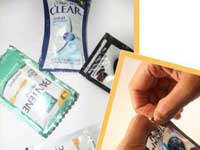By Martin Wright
Selling small quantities of products like shampoo in tiny sachets for a few rupees each is one way of bringing them within reach of the poor. But what happens to the sachets when the product’s finished? A few decades ago, waste was virtually unknown in villages. Now, litter, especially discarded packs and wrappers, is an all too common sight. As one of the companies which has gone down the ‘small is affordable’ route has drawn its share of flak.
Surely it would be simpler just to sell small quantities from a bulk dispenser? “We have actually developed a machine for refill options”, responds Meeta Singh, “but we’re concerned about tampering, which is a big issue in India. There is so much contamination, and we cannot risk people losing trust in our products. So, for the moment we’ve parked it.”
Instead the company’s embarking on an ambitious waste recovery programme. “We’re looking at ways of collecting the spent sachets, and using pyrolysis to produce oil which can serve as a diesel substitute. Eventually this could be extended to all our flexible packaging.”
Meanwhile, they’ve launched a pilot with by which customers bringing in recoverable waste to one of 30 Delhi stores receive an INR5 voucher redeemable against any Unilever product. It’s early days, says Singh, but if the concept works in practice, it could be a solution which could be applied more widely. “We should be able to process any flexible waste: it’s not as though we’ll say, ‘Oh, that’s one of our competitor’s sachets, we’re not taking that!’ Long term, we want to make sure that all waste has a value: that there’s no such thing as waste at all, basically.”
This feature appeared in ‘India: Innovation Nation’
http://www.forumforthefuture.org/greenfutures/shop/special-edition/india-innovation-nation




